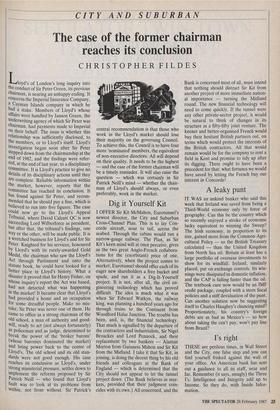CITY AND SUBURBAN
The case of the former chairman reaches its conclusion
CHRISTOPHER FILDES
Lloyd's of London's long inquiry into the conduct of Sir Peter Green, its previous chairman, is nearing an unhappy ending. It concerns the Imperial Insurance Company, a Cayman Islands company in which he had a stake. Members of Lloyd's whose affairs were handled by Janson Green, the underwriting agency of which Sir Peter was chairman, had payments made to Imperial on their behalf. The issue is whether this relationship was sufficiently disclosed, to the members, or to Lloyd's itself. Lloyd's investigation began soon after Sir Peter stepped down from the chairmanship at the end of 1982, and the findings were refer- red, at the end of last year, to a disciplinary committee. It is Lloyd's practice to give no details of its disciplinary actions until they are complete. Reliable information within the market, however, reports that the committee has reached its conclusion. It has found against Sir Peter, and recom- mended that he should pay a fine, which is believed to run into five figures. The case could now go to the Lloyd's Appeal Tribunal, where David Calcutt QC is now succeeding Lord Wilberforce as president, but after that, the tribunal's findings, one way or the other, will be made public. It is a wretched business for Lloyd's and for Sir Peter. Knighted for his services, honoured by Lloyd's with its rarely-awarded Gold Medal, the chairman who saw the Lloyd's Act through Parliament and onto the statute book, he could have looked for a better place in Lloyd's history. What a disaster it proved that Sir Henry Fisher, on whose inquiry's report the Act was based, had not detected what was happening in the market! It became clear that Lloyd's had provided a home and an occupation for some dreadful people. Make no mis- take, Sir Peter was never one of them. He came to office as a strong chairman of the old school, a man of authority and good- will, ready to act (not always fortunately) as policeman and as judge, determined to break the power of the 'broker barons' (whose baronies dominated the market) and bring power back to the centre of Lloyd's. The old school and its old stan- dards were not good enough. His case reaches its conclusion as Lloyd's, under strong ministerial pressure, settles down to implement the reforms proposed by Sir Patrick Neill — who found that Lloyd's fault was to look at its problems from within, not from without. Sir Patrick's central recommendation is that those who work in the Lloyd's market should lose their majority on the governing Council. To achieve this, the Council is to have four more 'nominated' members, the equivalent of non-executive directors: All will depend on their quality. It needs to be the highest — and the case of the former chairman will be a timely reminder. It will also raise the question — which was certainly in Sir Patrick Neill's mind — whether the chair- man of Lloyd's should always, or even preferably, work in the market.


















































 Previous page
Previous page